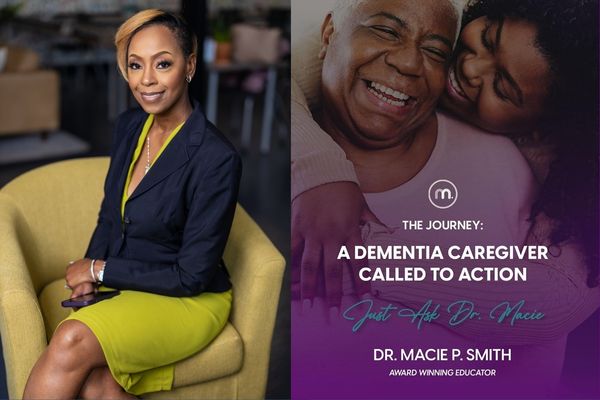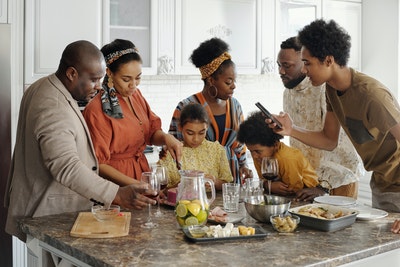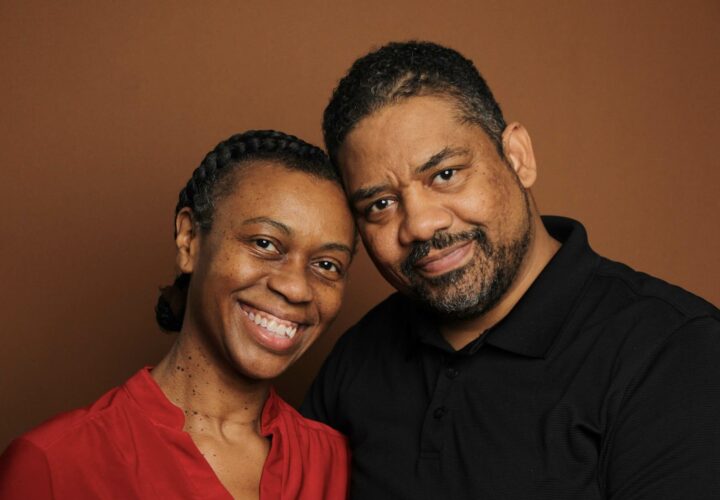When “Grammy P” struggled during a family game night, Simone E. Morris realized that she needed to have a dementia conversation with her daughter, Millie Walton. Here, Simone and Millie they share the story that inspired their book, "Remember Me, Grammy P," and how they hope it will help other families like theirs.
This article is part of the Diversity & Dementia series, produced by Being Patient with support provided by Eisai.
When a loved one has dementia, the diagnosis can impact everyone in the family, including children. Having a conversation about the disease, especially with so much stigma around the disease, can be difficult. Simone E. Morris realized that she had to have this conversation after her mother, known by her daughter Millie Walton as “Grammy P,” was visibly confused during a game of Trouble.
When her daughter was distressed about why her grandmother couldn’t understand the game’s rules, Morris realized that the “adult conversation” needed to become a family one.
“It was just hard for me to learn that she had dementia that day because I was scared. I didn’t know what to do, and she was going through that,” Walton recalled from that game night. “I thought she needed help, but I didn’t know what to do.”
Inspired by that experience, Morris and Walton co-wrote “Remember Me Grammy P,” a children’s book about dementia. Morris’s late mother, Patricia D. Edwards, or “Grammy P,” lived with dementia, and the book traces how their family dealt with diagnosis, care, and discussions around the disease.
Morris is a coach, trainer, speaker, podcaster, and author passionate about inclusion. Wanting to help other families on the dementia journey, Walton is a fourth-grader passionate about reading, art, soccer, acting, and singing. While the book is illustrated by Audeva Joseph, some of Walton’s artwork is featured in Remember Me, Grammy P.
Morris and Walton joined Being Patient video journalist Mark Niu in a conversation about the book. As a Black caregiver experienced in providing training on diversity, equity, and inclusion, Morris also discussed dementia care and access in marginalized communities.
Read or watch the conversation on Being Patient’s YouTube channel.
Being Patient: In the book, you note that this conversation around dementia starts because your family has Grammy P over for a game night, and then suddenly, Millie starts to realize that things aren’t right. Tell us what was going on, Millie.
Millie Walton: This [was] four years ago, and we typically [had] her over. It was a regular day. I came back from school, and we went home. Then, we just had dinner like [we do] regularly, but something was off. She forgot the rules; she was taking small bites out of her food and not acting like [usual]. Dad told her the rules a couple of times, but she just wouldn’t understand. I just saw something was off with her.
Being Patient: This was sort of a turning point moment for you, Simone, to have a conversation and explain things to her about Grammy P’s diagnosis, right?
Simone Morris: We had been on the journey and [were] not realizing the impact [on] our daughter. We kept it [an] adult conversation, talked about it amongst ourselves, and didn’t include her in the conversation.
But the situation, the journey, necessitated bringing her into the conversation and naming the word. I think we had some difficulty saying “dementia” because it made it real, and having a conversation with her about, “What is dementia? What does it mean?”
“But the situation, the journey, necessitated
bringing her into the conversation and
naming the word. I think we had some
difficulty saying ‘dementia’ because it made it real.”
Being Patient: You decided to write this book with your daughter from this moment. Did you write this because you wanted families to be able to bring all generations into this conversation?
Morris: Absolutely. It’s very necessary, even though it’s a tough space to be [in]. Millie was around her grandmother. She did take the journey, so she saw the changes, [and] she had to experience it. This project was a love project. We took the journey as a family. Millie worked with the illustrator in Haiti.
We slowed down the timeline of releasing the book because it became less important about delivering the book and more important about experiencing the journey and adding messages that could help other families in the book.
Being Patient: Millie, how did your relationship with your grandmother change through this journey of writing the book?
Walton: Writing another story with my mom was great, but writing it about my grandmother was even more because it [reminds me] of her whenever I see the book. All my friends at school were like, “How did you write a book?” Writing a book about my grandma was amazing.
Whenever I think of her, I always know that we have a book about her that we can just look up to, and that’s how we will remember her.
“Whenever I think of her, I always know
that we have a book about her that we can
just look up to, and that’s how we will remember her.”
Being Patient: Simone, did your relationship with your mother change when writing the book?
Morris: I was very close with my mom. It was a devastating loss. She passed on in February, and we got to show her the book. The book was released the day before she died. We got to show her the book, tell her about the book, and take a photo of her with the book. We experienced some delays, and it felt like she was giving us her blessing.
Being Patient: What do you hope people will take away from this book?
Morris: I hope families will know that it’s okay to have conversations about the topic at a family level and that they don’t have to have all the answers. Just [acknowledge] that dementia exists and is impacting their families, [listen] to the child, and [answer] questions about what’s happening. I hope it’s a discussion starter for families.
“I hope families will know that it’s OK to
have conversations about the topic at a family
level and that they don’t have to have all the answers.”
Being Patient: What should people know about the care and education needs of Black and other marginalized communities?
Morris: I didn’t know where to turn for support; it was a very emotional journey. I would say to tap into the Alzheimer’s Association as a resource and look for groups. I got on a Facebook group about caregiving and dementia to answer a lot of questions for me. I had to come off because some of it was too much for me, but at the time, it worked for me.
I will say, culturally speaking, my biggest frustration was more at the hospital and advocating for my mom. I felt like there was a lack of empathy for dementia whenever we entered the hospital scenario. I would mention that the conversations were happening, and there was a cognitive awareness, and I appreciate and respect that. Still, I felt there could be more empathy from a dementia standpoint.
Being Patient: Do you find that there’s a certain stigma around the disease in Black and other marginalized communities?
Morris: There’s a stigma with talking about it, naming it, and being private about what’s happening to your loved one. I went through a myriad of emotions in deciding to be very vulnerable, transparent, and raw about my mom’s story. “What would other people think?” “What would family members think?”
Then [I] decided that something was calling me to share this real-life story and also be heartened [that] this could help other families.
“There’s a stigma with talking about it,
naming it, and being private about what’s
happening to your loved one. I went through
myriad emotions in deciding to be very
vulnerable, transparent, and raw about my mom’s story.”
Being Patient: The book has activities to initiate or foster conversations. Tell me about the decision to include those.
Morris: We worked with an editor, and she made the book a lot better. She challenged us to come up with some ideas. There’s a puzzle, some fill-in-the-blank, and also on the website, you can download a discussion guide to have a conversation about dementia. There are additional resources in there; we’re just excited about the possibilities of what this could be, and working on a companion workbook to give even more activities.
The loved one is there, and as they go through the stages of dementia, the child doesn’t know how to communicate. I want to create a resource where there’s a section for the child, a section for the adult, and a section for your loved one who’s going through dementia in terms of activities. So, I want to make it more robust. I see it as more for families, [it’s] something you can discuss over dinner, or have it around your loved one and share.
Being Patient: What is your caregiving advice for people going through the journey right now?
Morris: I love the name of the [site], Being Patient. It has a double meaning because being patient with yourself [is important]. I had high expectations of how mature I would be during this journey, and it was outside of my comfort zone. I am very driven and results-oriented, and there were lots of things that were happening that were new to me and outside of my comfort zone.
I would say to be patient with yourself and to give yourself grace for the journey that you’re on. Not only is your loved one on a journey, but you are also on a journey to get support. I believe in mental health support, and that was a great support for me on this journey because there were a lot of emotions and feelings to process.
Tap into communities that can be supportive for you. I found out about the Alzheimer’s Association, but I didn’t use it as much as I could. I didn’t realize that it was a 24/7 service, so I could tap into it a bit more.
There were points where I was just struggling and making it through, but looking back, tapping into support, family, friends, and talking about it. For a long time, I didn’t talk about it because I was taught not to talk about these big things. I didn’t talk about it, and now I’m talking about it more.
It’s amazing to me that when I talk about it, someone will say, “I’m going through that right now.” Modeling the vulnerability opens the door for others to say, “Yeah, me too,” Let’s talk about it and help one another.
“Modeling the vulnerability opens the
door for others to say, ‘Yeah, me too,’ Let’s
talk about it and help one another.”
Being Patient: What’s next for both of you?
Walton: Our next step will be to write a summer camp book. She’s always writing books, so I don’t know what her next step will be, but I know that we might write a new book.
Morris: We have begun to do an audiobook for this, so Millie’s been in the studio. We are recording an audiobook for Remember Me, Grammy P, so that is coming in the future. Millie is correct. We plan to write a book about summer camp and the experiences of being the only one from a marginalized community standpoint. There is an opportunity for more diverse books and I have a feeling you will see a lot more books from us.
Being Patient: Has a memory or experience with Grammy P helped shape your book?
Walton: One day, we went home, and I was so excited to see her. It was [the game Trouble] because that’s our favorite family board game. It was just hard for me to learn that she had dementia that day because I was scared. I didn’t know what to do, and she was going through that. I thought she needed help, but I didn’t know what to do.
Morris: The Trouble game is that critical moment because it was over dinner. We spent a lot of time with my mom. She would come and stay the weekends with us, and we would love to play games over dinner.
When I think about it, a memory for me is us celebrating my mom’s last birthday, and family gathered around her. She wasn’t communicating a lot, and she would look at me with a puzzled look, and I was thinking, “She doesn’t remember who I am.” Millie was concerned that my mom would forget who she was, and I remember she looked at her and called her over.
Walton: My little cousin was like, “Oh my gosh,” and she called both of us over. [She] just wanted to give me a hug, but I know she didn’t forget you because she remembered all of us. It was just forgetting how to move, but she always remembered us.
Katy Koop is a writer and theater artist in Raleigh, NC.





How or where can I purchase a copy of this book?
I am a patient and have yet to tell my daughter and her two children about my diagnosis. I know this lovely children’s book would be a big help for us.
Hi Maggie, thank you for being part of our community. We’re so glad you found the Live Talk with Simone Morris meaningful and helpful for your situation. Here’s a link to purchase the book, Remember Me, Grammy P, from her website: https://www.simonemorrisenterprises.org/remember-me-grammy-p/?utm_source=organic&utm_medium=social . Take care.
I live in Scotland UK.
I am newly diagnosed and am.looking for any information about Dementia.
Hi Pat, thank you for being here. Feel free to check out our ‘recently diagnosed’ page for more information that could be useful: https://www.beingpatient.com/tag/recently-diagnosed/?utm_source=organic&utm_medium=social . Take care.